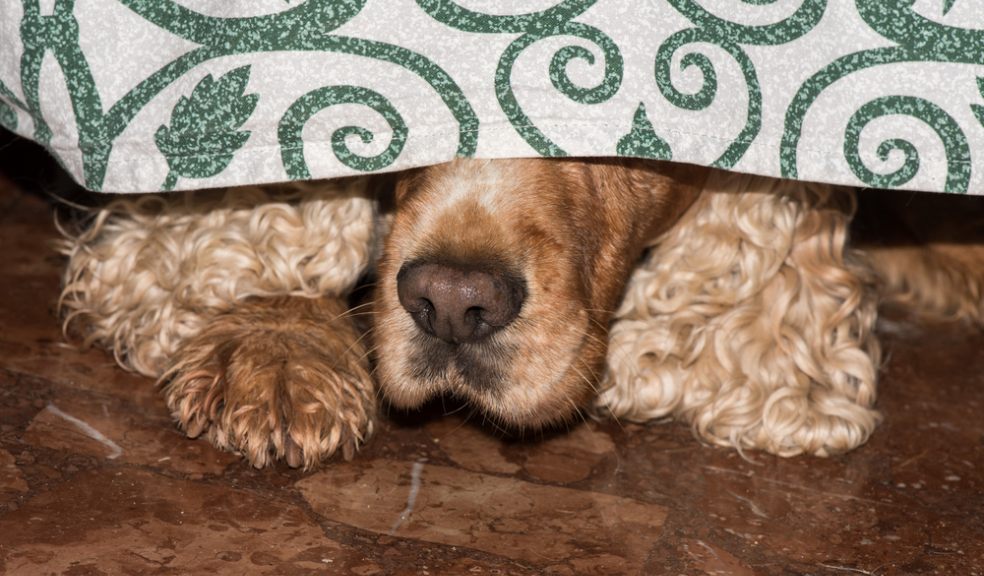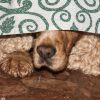
Remember remember your dog this November
Dogs Trust Ilfracombe will be “chewning” into the airwaves on Bonfire Night to help petrified pooches conquer their fear of fireworks and are urging Devon dog owners and radio stations to do the same.
A Dogs Trust survey of 3,750 pet owners shows that two-thirds of dogs are worried by fireworks and that 93% of their owners alter their routine during fireworks celebrations to try to minimise the trauma on their pets. Many dog owners are simply unaware of the effect that firework fear can have on their dogs and each year we receive calls from pet owners who simply don’t know how to calm their pets.
Dogs particularly hear much higher frequencies than we do and the wiz and pop of fireworks can be alarming for them so playing music helps to drown out frightening sounds.
One of these such dogs is Minnie, a three-year-old Bulldog who is so fearful of the noise of fireworks that staff will be playing her favourite soothing songs to help comfort her.
Dogs Trust Ilfracombe Supporter Relations Officer Claire Joselin comments: "Many dogs are worried by the loud bangs of fireworks and Minnie is so terrified that we will be doing everything we can to ensure she relaxes and stays calm on fireworks night.
"Playing music is a huge part of this so we are appealing to local radio stations to play anything and everything from slow songs to love ballads and classical compositions to help Minnie feel at ease!
"We will do all we can to help Minnie feel as comfortable as possible but nothing will beat a loving home where she can settle into a happy routine with a devoted new owner. She is looking for a quiet adult only home where she can cuddle up to her new owners. If you think you could give Minnie a harmonious home, please get in touch.”
Dogs Trust Head of Behaviour and Training Lynn Barber explains: "November is potentially a worrying month for dogs like Minnie as so many dogs are sensitive to sounds. They hear much higher frequencies than we do and the whizz, bang, pop of fireworks can be too much for them.
"If your dog chooses to hide then that is where he or she feels safest and it’s important that they’re allowed to stay in their hide-out as long as needed. We urge owners to simply try and make your four-legged friends as comfortable as possible whether it involves playing music or building a den or just reassuring them if they come to you.”
If you are among the millions of dogs owners whose dogs cower at Catherine wheels, are spooked by sparklers or rattled by rockets, Dogs Trust is on hand to help calm those canine quivers. The UK’s largest dog welfare charity is offering advice to help dogs and their owners enjoy a fright free November.
To help owners prepare their dogs ahead of November 5th fireworks, Dogs Trust has joined forces with vets, Sarah Heath and Jon Bowen. Together, Dogs Trust and the veterinary duo are offering a free sound based treatment programme, The Sounds Scary Audio Therapy Programme, preparing young dogs for distressing noises, such as fireworks, by playing specific noises to enable dogs to get use to the sounds from a young age.
The free download of the Sounds Scary with its corresponding how-to-use guide is available here and contains a collection of specifically recorded noises for use in desensitisation. Experts encourage owners to start using The Sounds Scary Audio Programme a minimum of six to eight weeks before the event. So remember to use this program in plenty of time for next year.
Dogs Trust has some simple advice to help make the firework season less stressful for dogs this firework season:
Before the fireworks begin:
- Walk your dog before dark – make sure your dog is well exercised and has had a toilet break before the fireworks begin.
- Feed your dog before the fireworks begin as he may become unsettled and not want to eat during the fireworks.
- Make sure your house and garden are secure during the fireworks as fear may make the dog act out of character and he may try to escape.
- Try to settle your dog before the fireworks start – if your dog is in familiar safe surroundings it will help him cope with the noise.
- Provide a safe hiding place – at noisy times around Bonfire Night, make sure your dog has somewhere safe in his or her favourite room, perhaps under the table. Close the curtains and turn up the volume on your TV or radio to drown out the firework noises.
- If your dog responds well to certain music, make a compilation and play it at a reasonable level to drown out the sound of the fireworks. Alternatively, put your radio on.
During the fireworks:
- Don’t punish a dog for cowering or reacting to the fireworks as this will intensify his or her fear. Owners should aim to remain relaxed and therefore provide a good role model to the animal when it is afraid.
- Don’t leave your dog alone in the house during the fireworks period – he or she may panic and this could result in an injury.
- Keep your dog busy – play games or enjoy some reward-based training to keep their mind off the noises. However if he just wants to hide away then don’t force him to come out of his hiding place, allow him to stay where he feels safe.
- Be careful not to reward your dog for reacting to noise – if he or she is upset giving them lots of attention may inadvertently reward him for being afraid. It is better to act as if there’s nothing to worry about. However, if your dog comes to you for comfort is best not to ignore him - very gently stroke him along his flanks and his ears - this may help to calm him.
- Never force a dog outside when fireworks are being let off, and even if your dog enjoys Bonfire Night, never let them off their lead outdoors when fireworks are being let off.
After the fireworks:
- If your dog does react badly to fireworks seek advice from your vet regarding desensitisation programmes to help him or her cope more easily next time. As these programmes generally take several weeks or more to complete, they are not something that can be started in the final run-up to firework season and must be carefully planned. You should also ask about Adaptil collars which contain a Dog Appeasing Pheromone -a scent that can comfort your dog and help him or her cope with their fears
- It is also important that in the long term your dog becomes less scared of loud noises. It is most effective to prevent noise phobia developing by ensuring that puppies are desensitised to loud noise.
Dogs Trust is the UK’s largest dog welfare charity and cares for over 16,000 stray and abandoned dogs each year through its network of 20 Rehoming Centres across the UK and one in Dublin.

















